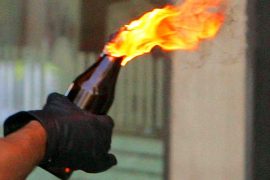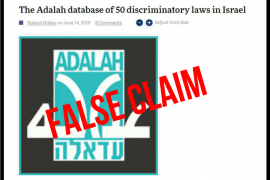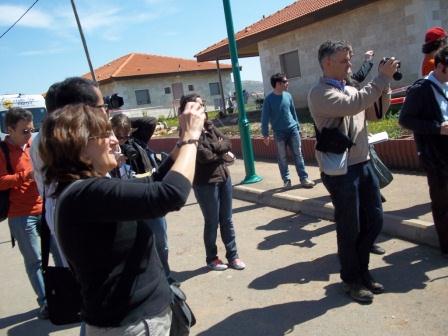Making Aliyah was the best decision I ever made and I am, to be sure, a passionate Zionist, and a proud citizen of the modern Jewish state. In Jerusalem I was married, and it is in Israel where, G-d willing, we’ll be blessed to raise children who will equally love Israel with all of their hearts.
I am also, however, to be sure, an American-Israeli. And, though 6000 miles away from the place I called home for over 40 years, and where my entire family and my closest friends still live, my affection for the land which welcomed my poor Eastern European Jewish grandparents – who merely yearned to breath free – to her shores has not waned.
I still am moved by the Star Spangled Banner, inspired by the heroism of American veterans who have sacrificed so much to advance the cause of liberty in the world, and understand how historically exceptional the freedom and prosperity which Americans continue to enjoy truly is.
And, ten years after the 9/11 attacks on the World Trade Center and Pentagon, the images of destruction and human suffering on that fateful day are still seared in my mind.
It is, of course, correct to affirm that America is not perfect, and that not every conflict is black and white. However, such a sober understanding of our political reality should not give way to the pathos of suggesting that there’s anything resembling a moral equivalence between the innocent victims of terrorist attacks and the perpetrators of such wanton violence.
As my job is to monitor the Guardian I’ve been exposed to far, far too much commentary advancing such comparisons – those who deny the inherent superiority maintained by the freedom of democracy over the tyranny of nihilism.
However, as 9/11 is, and should always be, a solemn day, instead of combating those, at the Guardian and elsewhere, who advance such ideas it seems far more appropriate to simply state what I affirm.
On Thursday night, The New Republic, in partnership with the Kennedy Center and the Pentagon, commemorated the tenth anniversary of September 11, 2001. The event (which can be viewed in its entirety here) was capped with remarks by Leon Wieseltier, The New Republic’s literary editor, on what Americans affirm.
Wieseltier is a truly gifted writer, whose eloquence and erudition has been an inspiration to me in attempting to elevate my day-to-day (far less than expansive and comprehensive) polemics, and my far less than artful blogging prose.
So, I will simply post his remarks in full without further commentary.
Though we encounter it as suffering, grief is in fact an affirmation. The indifferent do not grieve, the uncommitted do not grieve, the loveless do not grieve. We mourn only the loss of what we have loved and what we have valued, and in this way mourning darkly refreshes our knowledge of the causes of our loves and the reasons for our values. Our sorrow restores us to the splendors of our connectedness to people and to principles. It is the yes of a broken heart. In our bereavement we discover how much was ruptured by death, and also how much was not ruptured. These tears lead directly to introspection.
Here is what we affirmed by our mourning on September 11, 2001, and by the introspection of its aftermath:
that we wish to be known, to ourselves and to the world, by the liberty that we offer, axiomatically, as a matter of right, to the individuals and the groups with whom we live;
that the ordinary lives of ordinary people on an ordinary day of work and play can truthfully exemplify that liberty, and fully represent what we stand for;
that we will defend ourselves, resolutely and even ferociously, because self-defense is also an ethical responsibility, and that our debates about the proper use of our power in our own defense should not be construed as an infirmity in our will;
that the multiplicity of cultures and traditions that we contain peaceably in our society is one of our highest accomplishments, because we are not afraid of difference, and because we do not confuse openness with emptiness, or unity with conformity;
that a country as vast and as various as ours may still be experienced as a community;
that none of our worldviews, with God or without God, should ever become the worldview of the state, and that no sanctity ever attaches to violence;
that the materialism and the self-absorption of the way we live has not extinguished our awareness of a larger purpose, even if sometimes they have obscured it;
that we believe in progress, at home and abroad, in social progress, in moral progress, even when it is fitful and contested and difficult;
that just as we have enemies in the world we have friends, and that our friends are the individuals and the movements and the societies that aspire, often in circumstances of great adversity, to democracy and to decency.
It has been a wounding decade. Our country is frayed, uncertain, inflamed. There is hardship and dread in the land. In significant ways we are a people in need of renovation. But what rouses the mourner from his sorrow is his sense of possibility, his confidence in the intactness of the spirit, his recognition that there is work to be done. What we loved and what we valued has survived the disaster, but it needs to be secured and bettered, and in that secure and better condition transmitted to our children. Our dream of greatness must be accompanied by an understanding of what is required for the maintenance of greatness. The obscenities of September 11, 2001 exposed the difference between builders and destroyers. We are builders. Let us agree, on this anniversary, that it is an honor to be an American and it is an honor to be free.





